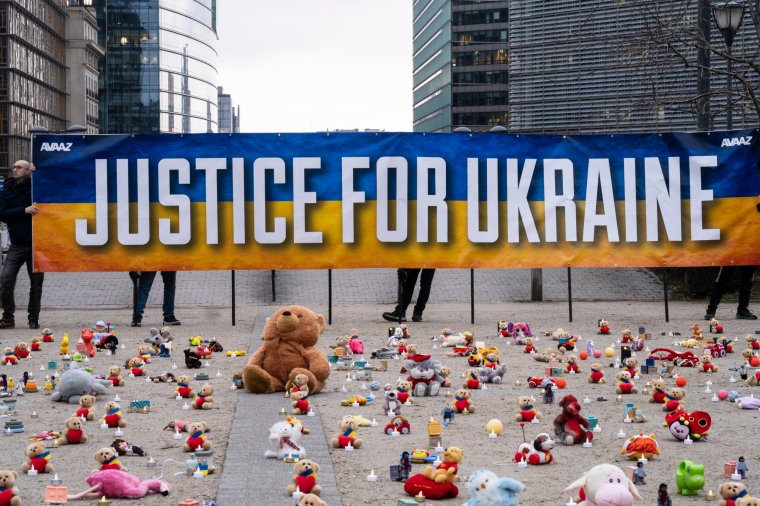Larysa* thought she would never see her son Mykola again. In October last year, Russian forces occupying Kherson in Ukraine forced the teenager and busloads of other children to take a two-week seaside holiday in Russian-held Crimea. The fortnight passed. No one returned.
The trip organisers hid the children’s location and restricted contact with parents. It took until January for Larysa to find her son. With help from Russian volunteers risking their own safety, she travelled through Europe and Russia to reach the peninsula. But faced interrogation and arrest when she arrived.
“Two Russian military men started asking me questions,” Larysa told i. “They shouted: ‘Who sent you here? With what mission? If you don’t tell us the truth now, you won’t see the boy again’.”
Mykola came home. But Ukraine’s parliamentary commissioner for human rights, Dmytro Lubinets, told Ukrainian media last week the Kremlin has illegally deported about 150,000 Ukrainian children since the war began a year ago. Finding an accurate figure for the number of children taken to Russian territory is difficult due to active fighting and the occupation of Ukraine’s territory by Russian forces. However, data from Ukraine’s official National Information Bureau claims this is up to 738,000 children, citing Russian Federation sources. Of these, 16,221 cases are officially verified and only 307 have been returned.
“I know which Ukrainian city these children are from and where they roughly stay in the territory of the Russian Federation,” Mr Lubinets told the Ukrainian National News Agency Ukrinform last week in reference to the verified cases.

This month, a report published by Yale University suggested at least 6,000 Ukrainian children aged between four-months and 17 years were living in Moscow-backed camps. Researchers identified 43 locations described as holiday facilities or foster care and adoption centres. Of these, 11 were more than 500 miles away from the Ukrainian border.
The report also said at least 32 camps systematically tried to re-educate children with “Russia-centric academic, cultural, patriotic, and/or military education”.
Among the alleged victims are also thousands of orphans and fostered children. On 30 May, 2022 Russian President, Vladimir Putin, signed a decree easing the process for Ukrainian children without parental care to receive Russian Federation citizenship. This sounded alarm bells that Russia was erasing children’s identities.
Mr Putin and his presidential commissioner for children’s rights, Maria Lvova-Belova, have publicised efforts to “evacuate” orphans and fostered children from territories recently occupied by Russia to “safe places”. In May 2022, Ms Lvova-Belova announced 1,200 children from orphanages in Donetsk and Luhansk had arrived in the country. A video on her Telegram channel from September pictured her at a Moscow airport with 135 children from Mariupol. Other videos show teary-eyed Russian adoptive parents meeting Ukrainian adoptees. Ms Lvova-Belova herself adopted a 15-year-old Ukrainian boy, while this week at a Moscow rally, children from Mariupol appeared on stage alongside a Russian soldier.
Forcible transfer and deportation of civilians into an occupier’s territory is forbidden under the Fourth Geneva Convention. This act is also included in the 1948 Genocide Convention. But while courts may seek to prosecute Russia in the future, right now experts say the concern is how to return children as fast as possible.
Mikhail Savva, a professor and expert at the Nobel Peace Prize-winning Centre for Civil Liberties in Ukraine, said the Ukrainian government needed to increase legal pressure on Russia.
He suggested international organisations, namely the United Nations, can impact the Kremlin’s actions. “The Russian Federation does not withdraw from the UN, because it can block the decisions of the Security Council,” he said. “But it cannot block the decisions of various UN agencies, and this creates an opportunity to return children.”
More on Russia-Ukraine war
He also said the state needed to work more closely with Ukrainian and Russian human rights activists to help parents come forward. Mr Savva noted that at the Crimean camp, some children were still waiting for parents to rescue them. “Were the parents killed, left Ukraine, or simply lost contact?” he said. “The capacity of civil society organisations to find such parents is much less than the capacity of the state.”
A spokeswoman at the International Committee of the Red Cross (ICRC) confirmed it was discussing the situation with “the parties to the conflict”. She urged families of missing children to open tracing cases with ICRC.
But Unicef spokesman, James Elder, said currently the UN agency could not access non-government controlled Ukrainian territories, or places where children were reportedly located. “We are pursuing all possible pathways to help these children and we will continue to seek dialogue and offer support to cooperate on family tracing and reunification,” he said.
He added that cases such as Larysa’s proved reunifying children was possible.
*Names have been changed
